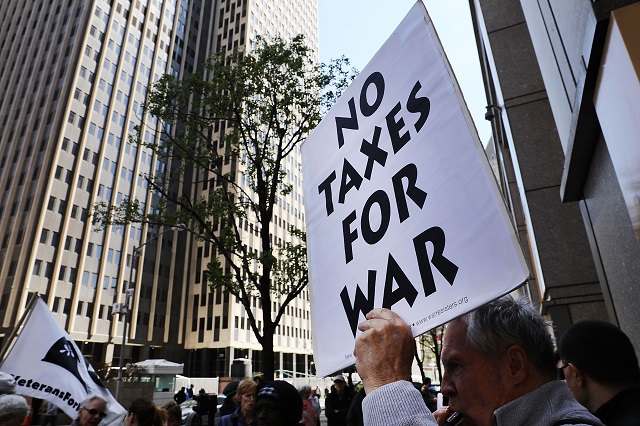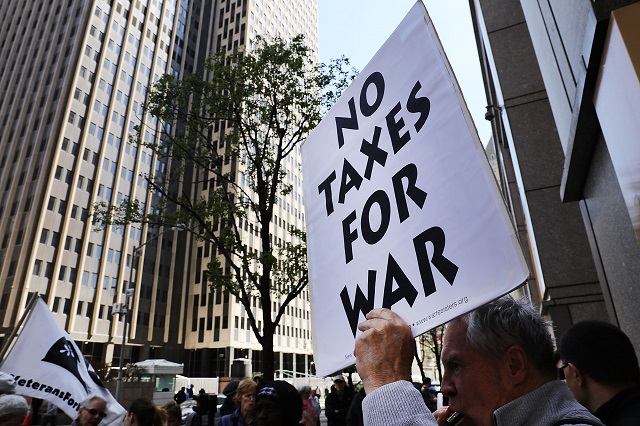
Support justice-driven, accurate and transparent news — make a quick donation to Truthout today!
 Protesters converge outside of the Internal Revenue Service on tax day in lower Manhattan to protest tax dollars being spent on the military on April 18, 2017, in New York City. (Photo: Spencer Platt / Getty Images)
Protesters converge outside of the Internal Revenue Service on tax day in lower Manhattan to protest tax dollars being spent on the military on April 18, 2017, in New York City. (Photo: Spencer Platt / Getty Images)
A new analysis offers a damning assessment of the United States’ so-called global war on terror, and it includes a “staggering” estimated price tag for wars waged since 9/11 — over $5.6 trillion.
The Costs of War Project at Brown University’s Watson Center says the figure — which covers the conflicts in Iraq, Syria, Afghanistan, and Pakistan from 2001 through 2018 — is the equivalent of more than $23,386 per taxpayer.
The “new report,” said Paul Kawika Martin, Peace Action’s senior director for policy and political affairs, “once again shows that the true #costofwar represents a colossal burden to taxpayers on top of the tremendous human loss.”
Does the $24,000 you spent on the #Iraq, #Afghanistan, etc. wars make you feel safer? The @WatsonInstitute’s new report once again shows that the true #costofwar represents a colossal burden to taxpayers on top of the tremendous human loss. #EndEndlessWarhttps://t.co/bVwVIQVWjO
— Paul Kawika Martin (@PaulKawika) November 8, 2017
The center’s figure is far greater than the $1.5 trillion the Pentagon estimated (pdf) in July for the costs of the wars in Afghanistan, Iraq, and Syria, as it gives a fuller picture by including “war-related spending by the State Department, the Department of Veterans Affairs, and Homeland Security,” writes Neta C. Crawford, a professor of political science at Boston University.
Her report notes that even the $5.6 trillion tally underestimates the true figures, as it doesn’t capture “every budgetary expense related to these wars,” such as state and local costs to take care of veterans; nor does it take into account the funds used for military equipment “gifts” to countries involved in the conflicts.
“In sum,” it states, “although this report’s accounting is comprehensive, there are still billions of dollars not included in its estimate.”
In addition, as the Washington, D.C.-based organization Win Without War notes, “let’s not forget that when we talk about what war costs there are also human costs. As obscene as it is to waste so much money, it is more obscene to waste human life.”
And let’s not forget that when we talk about what war costs there are also human costs. As obscene as it is to waste so much money, it is more obscene to waste human life. #EndEndlessWar https://t.co/Q75oAuKjBx
— Win Without War (@WinWithoutWar) November 8, 2017
Crawford’s report hammers home that point:
Moreover, a full accounting of any war’s burdens cannot be placed in columns on a ledger. From the civilians harmed and displaced by violence, to the soldiers killed and wounded, to the children who play years later on roads and fields sown with improvised explosive devices and cluster bombs, no set of numbers can convey the human toll of the wars in Iraq and Afghanistan, or how they have spilled into the neighboring states of Syria and Pakistan, and come home to the US and its allies in the form of wounded veterans and contractors. Wars also entail an opportunity cost — what we might have done differently with the money spent and obligated and how veterans’ and civilians’ lives could have been lived differently.”
New @CostsOfWar study predicts the US budgetary costs of post-9/11 wars will reach $5.6 trillion by the end of fiscal year 2018 #costsofwar https://t.co/3BsicZeFEc pic.twitter.com/hBBC1UiT3H
— Watson Institute (@WatsonInstitute) November 8, 2017
Echoing a point made by other observers of failed US counter-terrorism strategies, the report states that “the more people the US kills, the more seem to join the organizations the US was already fighting, even as new radical groups spring up.”
The report also suggests the war costs will only continue to pile up: “There is no end in sight to the US military presence in Afghanistan and the associated operations in Pakistan. Similarly, despite recent gains, there is little clear sense of how long the US will be engaged in Iraq and Syria.”
Reacting to the new report, William D. Hartung , director of the Arms and Security Project at the Center for International Policy, writes in an op-ed at The Hill: “Was this huge expenditure of blood and treasure worth it? Did it substantially reduce the risks of terrorism, or reduce the likelihood of future conflicts? The short answer is no.”
Press freedom is under attack
As Trump cracks down on political speech, independent media is increasingly necessary.
Truthout produces reporting you won’t see in the mainstream: journalism from the frontlines of global conflict, interviews with grassroots movement leaders, high-quality legal analysis and more.
Our work is possible thanks to reader support. Help Truthout catalyze change and social justice — make a tax-deductible monthly or one-time donation today.